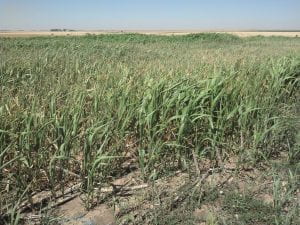Sandy Johnson, extension beef specialist, Colby and John Holman, cropping system agronomist, Garden City
Plants in the sorghum family are known to be a potential risk for prussic acid (also known as hydrogen cyanide, HCN) poisoning. Many plants contain a compound known as dhurrin that, when exposed to enzymes, is converted to hydrogen cyanide. The hydrogen cyanide interferes with oxygen transport and, if enough is consumed, can quickly result in shortness of breath, convulsions, and death. Continue reading “Good News and Bad News on Prussic Acid”
 Many Kansas cattle operations rely on some type of harvested feed to use in the winter months and common among those sources is forage sorghum, sorghum-sudangrass and sudan. Forages in the sorghum family are prone to two different problems for feeding cattle, nitrate poisoning and prussic acid (hydrocyanic acid, HCN) poisoning. They are easy to get confused because both result in a lack of oxygen availability to the animal and are more likely to occur when the plant is stressed (fertility, hail, drought).
Many Kansas cattle operations rely on some type of harvested feed to use in the winter months and common among those sources is forage sorghum, sorghum-sudangrass and sudan. Forages in the sorghum family are prone to two different problems for feeding cattle, nitrate poisoning and prussic acid (hydrocyanic acid, HCN) poisoning. They are easy to get confused because both result in a lack of oxygen availability to the animal and are more likely to occur when the plant is stressed (fertility, hail, drought).